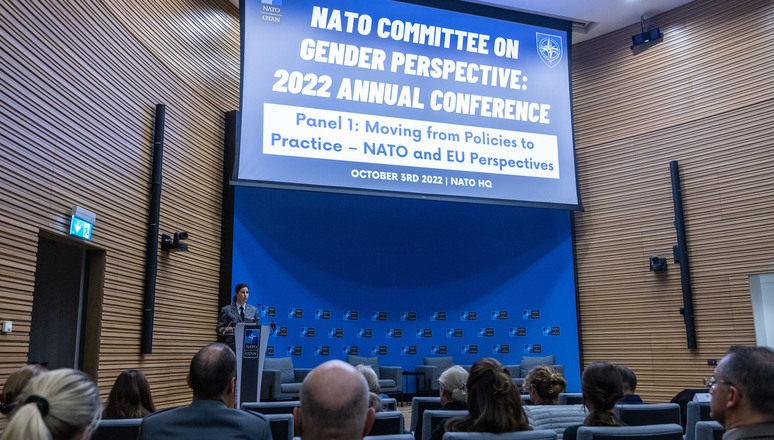From 3rd to 5th October 2022, approximately 170 participants from 42 NATO Allies and Partners as well as academic organisations and civil society gathered for the Annual Conference of the NATO Committee on Gender Perspectives (NCGP). The conference focused on "Integrating Gender Perspective - Moving from Policy to Practice" with a series of panels and roundtable discussions.

In his opening remarks, NATO Deputy Secretary General Mircea Geoană admonished Russia's war in Ukraine, the war crimes being committed against the local population as well as the specific targeting of women and children in this conflict. "Dehumanizing the Ukrainian population has been part of Russian tactics on the ground, including torture, forced deportations, and conflict-related sexual violence. These horrific war crimes impact women, men, boys and girls in different ways", he underscored. He also acknowledged how "Russia's disinformation campaigns are attempting to divide NATO unity and erode our communities' resilience, also through false gender-based narratives" but to no avail as NATO Allies have demonstrated unparalleled unity and solidarity since the start of the conflict.
Following up, the Director General of the NATO International Military Staff (IMS), Lieutenant General Janusz highlighted the importance of the Women, Peace and Security agenda as well as the integration of the gender perspective across all of NATO's core tasks, as reflected in the new Strategic Concept agreed at the June NATO Summit and the NATO Military Committee Conference, held in Estonia, in September 2022. "The special session on diversity led the NATO Chiefs of Defence to a lively and thought-provoking discussion, looking at how nations can learn from each other to improve diversity within Allied Armed Forces. They also expressed that they want to improve this. Not only because they want to practice the values that NATO preaches, but also because having a more diverse talent pool in their workforce increases NATO's effectiveness on the battlefield", he added.
Lieutenant General Adamczak noted that "the Gender Perspective is not just about women's issues, but about how men, women, boys and girls are affected differently in conflict. As the nature of conflict is changing, it is important that we address the gender perspective of new threats and how they impact the human environment. It is good to see that this annual conference aims to do just that - to address hybrid threats, disinformation, fake news and the impact on men, women, girls and boys".
Participants then attended a series of panel discussions focussed on "Moving from Policies to Practice - NATO and EU Perspectives", "Hybrid Threats and the Integration of Gender Perspective" and "Disinformation and the Integration of Gender Perspective". They were also able to participate in closed-door topical roundtables to promote frank but constructive discussions regarding upcoming NATO work strands.
Furthermore, some NATO Allies - Belgium, Croatia, France, Italy, Romania, Spain, United Kingdom and the United States - presented how they train their armed forces on the gender perspective on operations during pre-deployment training. The aim was to share challenges, innovative ideas and lessons learned with each other.
Following two days of closed syndicate work, Nations agreed to several recommendations regarding gender doctrine, resources, and approaching human security in military operations while integrating the gender perspective. "The conference provided an excellent opportunity to hear different views - both military and civilian, from inside NATO, from academia and civil society. Discussing topics such as hybrid threats, disinformation, and assimilating the WPS and Human Security agenda in the military instrument of power, are key to ensuring that the gender perspective is integrated into what we do here at NATO", concluded Lieutenant Colonel Katherine Prudhoe, Gender Advisor to the IMS.
The NCGP is responsible for promoting gender mainstreaming and integrating a gender perspective as a strategy to increase operational effectiveness in NATO with the Women, Peace and Security agenda. It is the advisory body to the NATO Military Committee on gender related policies for the armed forces of the Alliance.






